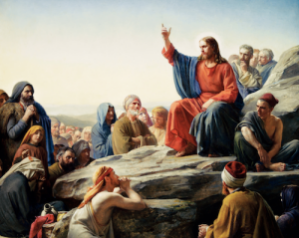Robert King (e-watchman)
144,000 sealed and the Revelation of Christ
How is the number 144,000 inclusive of (if literal) ALL who will go to heaven? A unique feature of the 144,000 sealed ones is indicated at Rev. 6:11 where it says they wait under the altar until “the number was filled of their fellow slaves and their brother WHO WERE ABOUT TO BE KILLED AS THEY HAD BEEN.” Rev. 7:4 gives us the specific number of these sealed ones. Does this not indicate that they all die? However, 1 Cor. 15: 51 reveals that not all will “fall asleep in death”, and 1Thess. 4:17 says “the LIVING who are surviving will, TOGETHER with them, (“them” defined in vs. 16) be caught away in clouds to meet the Lord in the air…” How do you reconcile this scripturally?
This is a very deep subject and it is not something that is easy to understand or explain. But I will try to make it simple.
First, the 144,000 who will ultimately rule with Christ in heaven are chosen from among mankind over a period of approximately 2,000 years. Jesus said that ‘many are called but few are chosen.’
Some times you hear Jehovah’s Witnesses say that so-and-so is one of the 144,000, or something like that. But this is not really a proper thing to say since even though a person may be anointed – that is to say he have been called, invited – that does not necessarily mean that he will ultimately be approved — chosen.
Obviously, though, upon an anointed person’s death Jehovah will have either approved or disapproved them for entry into the heavenly kingdom.
Thus, if they have gained Jehovah’s approval they are sealed at some point prior to their death. Paul spoke of this. For example, when writing to the Philippians Paul said the following: “My aim is to know him and the power of his resurrection and to share in his sufferings, submitting myself to a death like his, to see if at all possible I may attain to the earlier resurrection from the dead. Not that I have already received it or am already made perfect, but I am pressing on to see if I may also lay hold on that for which Christ Jesus selected me. Brothers, I do not yet consider myself as having taken hold of it; but one thing is certain: Forgetting the things behind and stretching forward to the things ahead, I am pressing on toward the goal for the prize of the upward call of God by means of Christ Jesus.”
To the Philippians Paul indicated that he had not yet received God’s ultimate seal of approval. He was pressing towards it as his goal.
However, some years later when he wrote to Timothy from Rome, where he was in prison, the apostle stated: “For I am already being poured out like a drink offering, and the time for my releasing is imminent. I have fought the fine fight, I have run the race to the finish, I have observed the faith. From this time on, there is reserved for me the crown of righteousness, which the Lord, the righteous judge, will give me as a reward in that day, yet not to me only, but also to all those who have loved his manifestation.”
In his saying “from this time forward” implies that Paul had received some indication from God that he had been sealed and had the assurance of receiving the reward of the upward call that he had been pursuing.
When, though, would Paul receive the reward? “In that day” — meaning, in the day of the Lord — that is to say, during the presence of Christ. That is when “the earlier resurrection from the dead” begins about which Paul wrote in the cited passage in Philippians, what Revelation calls “the first resurrection.”
Paul and all those other faithful Christians back then who were anointed and were faithful until the end all were sealed. But their sealing did not result in their actually receiving the reward then. Christ’s Kingdom must come to power first. Until then they are sleeping in death, just like everyone else who has lived and died. But that is why the 7th chapter of Revelation speaks of those who have been sealed as if the sealing takes place then, because that is when the first resurrection starts, during the parousia of Christ.
But were all of those first century Christians slaughtered with the axe? No. But a representative number were killed. We know the apostle James was. So was Paul. Apparently the apostle Peter was killed too. Many were killed by Nero. So, like in the case of the murdered Abel, when God said to Cain, ‘your brother’s blood calls out to me from the ground,’ those martyred Christians from the first century call out to the throne of God for vengeance, for justice.
It is as if they are told to wait for the rest of the 144,000 to be killed. But, will it be a mere representative number, as in the first century? No. During the conclusion the Devil will go off to wage war against the remaining ones of the 144,000. He will be allowed to go so far as to conquer and kill all of the holy ones— all 7,000 of them. In this way the Devil’s world will be called to make an account before God for all the spilled blood of Christians and the shed blood of Christ himself.
As for what Paul said about ‘we the living’ who survive to the presence not sleeping in death, the apostle was not saying that they will not die. The point he was making was that those who do die during the presence of Christ will not sleep in death as did their predecessors who died before the presence of Christ begins. Paul explained that those who die during the parousia are instantaneously changed, in the twinkling of an eye. Worded differently, the contrast is between sleeping and not sleeping.
Ironically, this is what the masses of churchgoers believe, as well as virtually all religious people – that we have an inherent immortal soul that survives the death of the body. Of course, that’s not true. But for those who have been born again and sealed during the presence, there is no death. True, from the human perspective, from the vantage point of an earthly observer, they would see a corpse. But the person who formally inhabited that body will have been changed into an immortal spirit. That’s what Paul meant when he spoke of not sleeping in death, but of being changed.
Once all of the living sealed ones have been changed then the marriage of the Lamb will take place. In that way all of the 144,000 will be joined together, as if in the clouds – united with Christ, who himself is spoken of as coming on the clouds of heaven.
When all the holy ones are joined with Christ then the battle of Armageddon will commence and all of those who are on the side of Satan and his beast and who persecuted and killed the brothers of Christ, or who approved of their killing, will be destroyed and the curtain will come down on Satan and his world. And a new world will begin.



